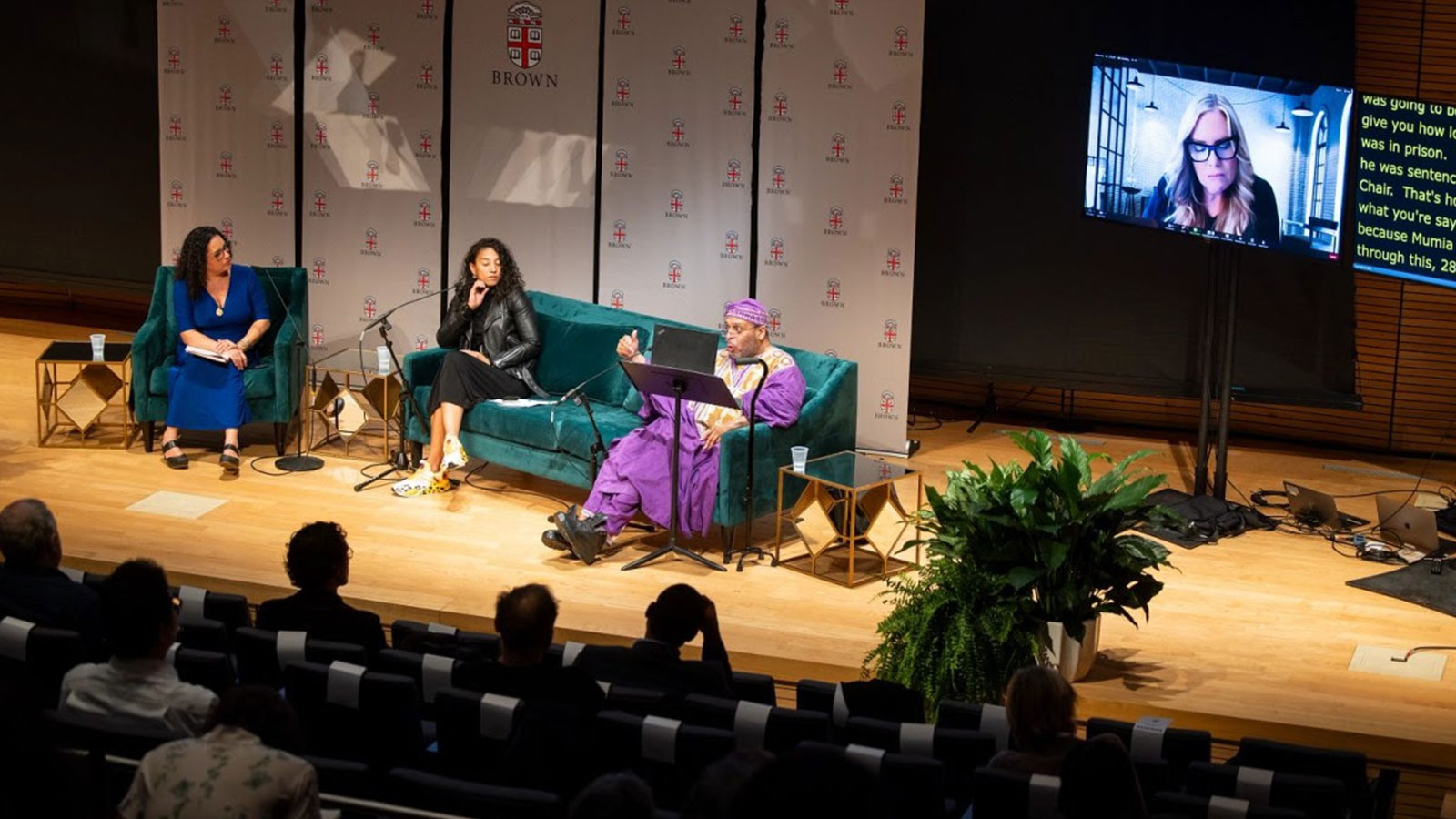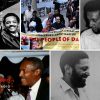Brown University Incarceration Conference opens with movement icon Angela Davis and other Black feminists assessing Mumia Abu-Jamal and gender.
By Todd Steven Burroughs —
Special to IBW21.org
The mind is time, the mind is space. A horn rush, a bass flush for minds to taste
— “Interlude (Butterfly & Ladybug Mecca),” Digable Planets
PROVIDENCE, R.I.— Mumia Abu-Jamal, a man married three times and divorced twice, has always viewed his relationship with women as his lodestar. He has needed a woman since he left his mother Edith Cook to go be first a high-school dropout Philadelphia Black Panther and later a college-dropout airwave adventurer, eventually representing the decolonized wing of the Baby Boomer broadcaster era. Women have loved him and have fought for him behind bars for decades. And at Brown University, the site of a brand-new exhibit of the imprisoned author’s papers, many of them gathered with the purpose of discussing his legacy from a Black feminist perspective but eventually wound up discussing the significance of place and time.
This turned out to be important because the September 27 packed hall in the Saloman Center, here for the opening of the three-day “Voices of Mass Incarceration” symposium, contained the now-standard 7-1 female-to-male ratio common to colleges and universities across the land. So Movement legend Angela Davis, award-winning historian Johanna Fernandez, writer and activist Julia Wright (who was on Zoom from Europe, representing the international scope) and moderator Tricia Rose had to really bring something substantial to those in and outside the 500-seat auditorium who would soon inherit the mid-21st-century leadership table.
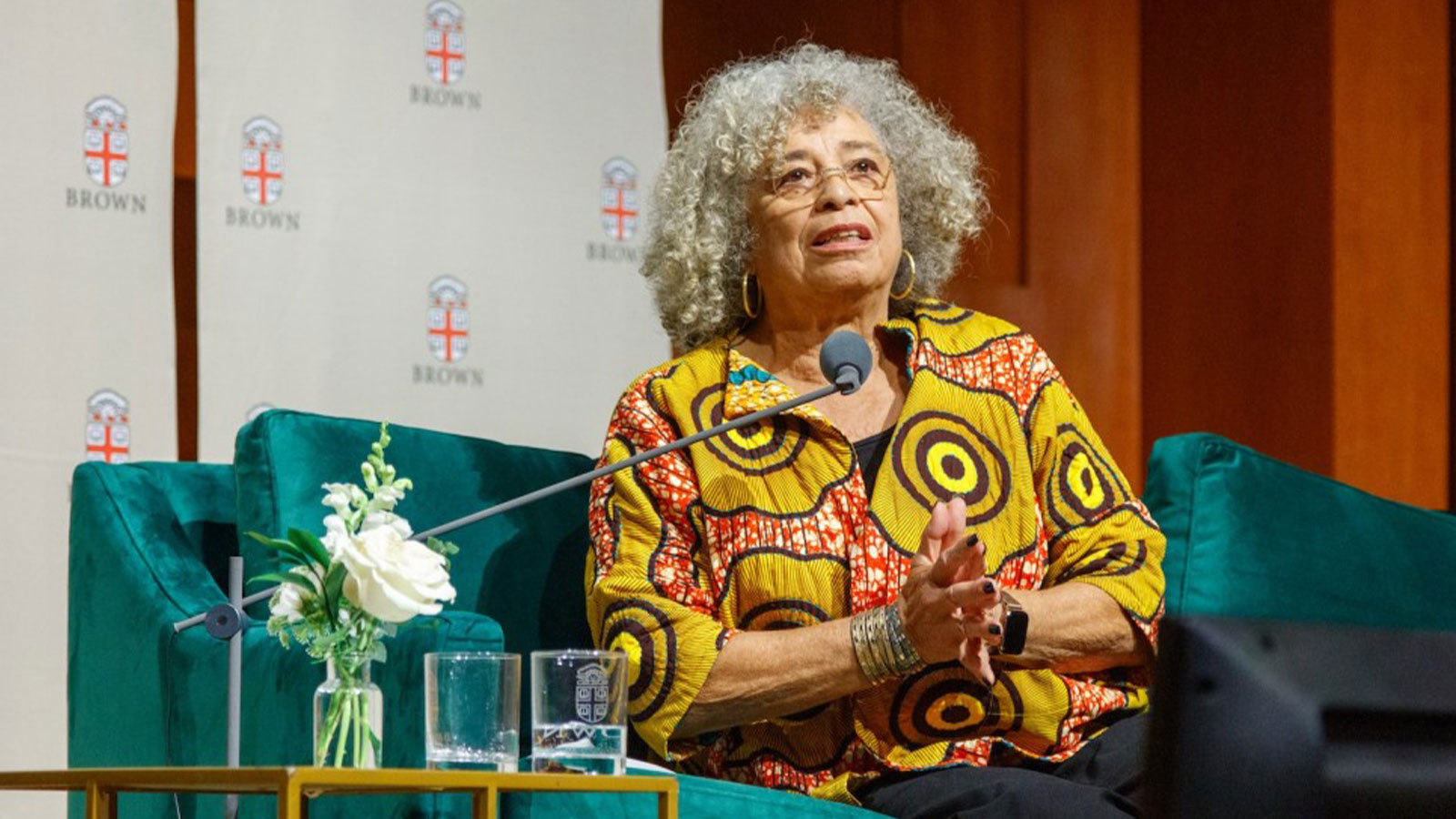
Brown U. Incarceration Conference. Angela Y. Davis (Photo: Nick Dentamaro/Brown).
Davis declared that “women have always been responsible for these movements—always.” She briefly mentioned that her mother had fought for the freedom of the Scottsboro 9, a group of Black men framed for raping white women in the Depression era. But women’s contributions “were actively erased,” and as subject and scholar, she should know.
Fernandez, a fighter for Abu-Jamal’s freedom while writing an award-winning book on The Young Lords Party, added Abu-Jamal’s recently-deceased wife Waydia to that historic whiteout, saying she and Abu-Jamal’s late sister Lydia Barashango never got the media attention offered to Maureen Faulkner, the blonde, white widow of Daniel Faulkner, the white police officer Abu-Jamal was sentenced in 1983 for murdering near the close of 1981. Tellingly, she pointed out that the phrase “cop killer” is both a response to the Panthers’ moniker of police as “pigs” and the replacement of the “Black rapist” in White America’s racist heart.
The exhibit subject—the first currently incarcerated person to have a university acquire his papers, according to Brown—assisted in the task of seizing the present moment. (Disclaimer: the author is an exhibit consultant.) He blasted through space and time by calling into his own public forum from prison, unfreezing himself in the minds of the audience. Fernandez and he have made this overheard-Abu-Jamal-phone-call—complete with the now-expected, computerized state interrupt “This call is from a correctional institution and is subject to monitoring and recording”—a public ritual for about 12 years now, a powerful way to keep Abu-Jamal live and alive. Abu-Jamal, a doctoral candidate in the Department of Consciousness at the University of Santa Cruz (Davis’ old employer) and who speaks four languages, explained that English does not work well when gendering the masculine “master.” He described how the women in his life represented on stage were masters in every sense and that culture can break language. “We are at a convocation of masters, and I, for one, thank all of you.”
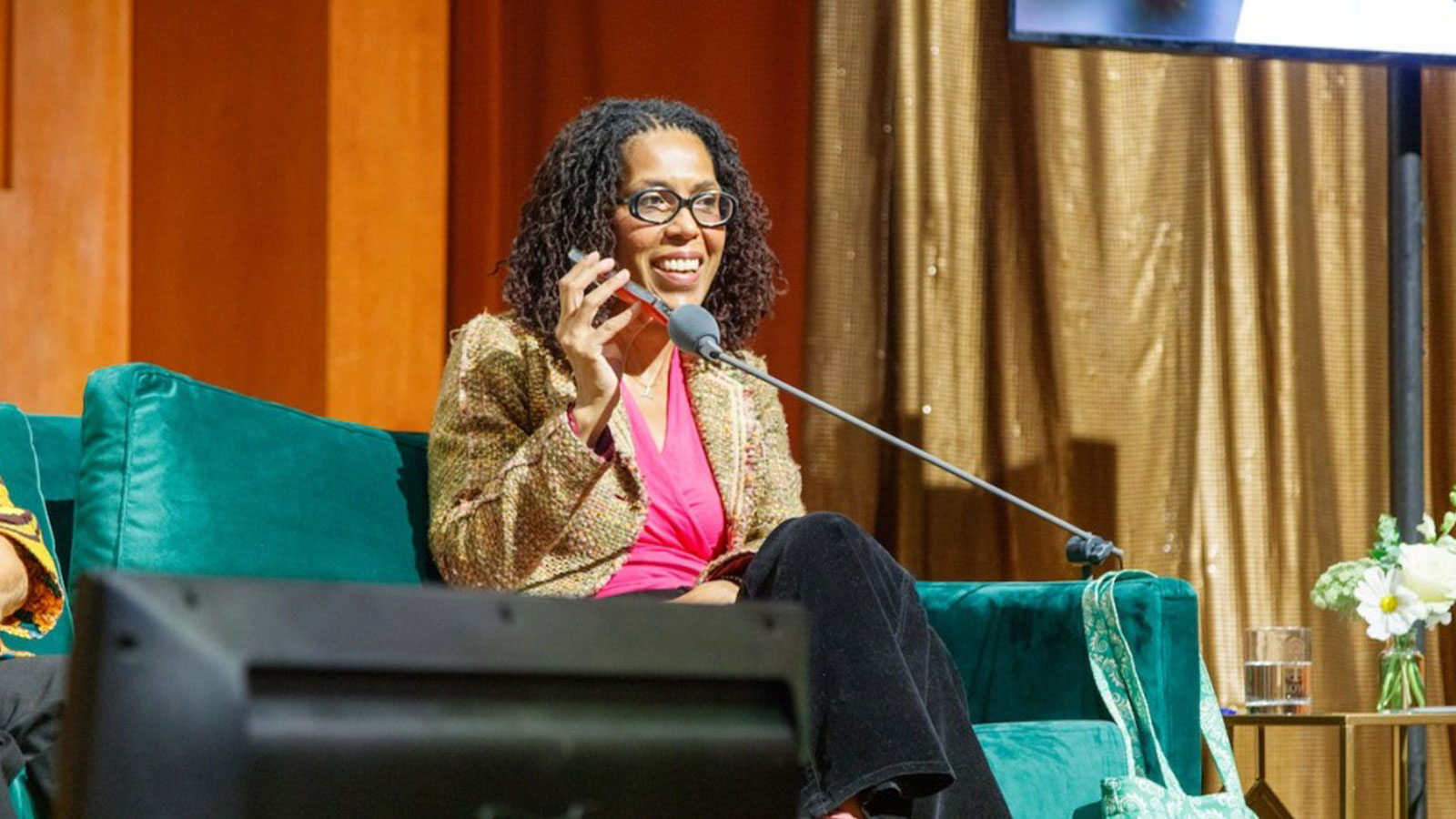
Mumia Abu-Jamal, who is incarcerated in a Pennsylvania prison, joined a panel discussion via Johanna Fernandez’s speakerphone. Photo: Ben Tyler/University Library
So how to describe Abu-Jamal’s strange and savage journey from the Philadelphia projects to a spacetime that combined the efforts of the Brown University Library, the Pembroke Center and the Ruth J. Simmons Center for the Study of Slavery and Justice? It’s not complicated if Black women, followed by all women, are centered. They helped push Abu-Jamal past the time-freeze of prison, helping him push himself ever forward.
Just like you reading this, first there was momma. And then his sister Lydia. But then came the fine older sister in black leather that he tried his teenager rap on. She was part of a new, hip organization and gave him a newspaper to read.
He would later join that organization as Wes “Mumia” Cook and learn journalism by working at that newspaper. His teacher? A Black Panther by the name of Judi Douglas. As Abu-Jamal told Democracy Now! host/executive producer Amy Goodman about that space-time continuum in 2004, while promoting his Panther study/memoir We Want Freedom:
GOODMAN: Can you talk about your life in the Black Panther Party, how old were and what this view of the Black Panther Party is that you want to convey from prison?
ABU-JAMAL: Well, when I joined, I was —- I had just turned 15 or 14, I believe. I had the pleasure of serving not just in Philadelphia, but also in the Bronx in New York and in the National Office in Berkeley, right outside of Oakland in California. I met some really pretty remarkable people. In all of my readings, and I have read most, certainly not all, but most -—
COMPUTER VOICE: This call is from a correctional institution and is subject to monitoring and recording.
ABU-JAMAL: We didn’t know that, right? I read most of the books about the Black Panther Party, and I felt, really, that important stories were not told. Most of them had to do with the women in the party, and there were women that wrote about their own experiences in the party, there was no one who wrote about average, less well known, everyday women who were members of the Black Panther Party who were really the soul and the spirit, you know, who — the backbone of the party. You know, everybody knows about Huey and everybody knows about Eldridge of course and if you talk about women, everybody will tell you about Kathleen and Elaine Brown. Everyday women really held that organization together. What the programs motivated people, went out into the community to do community work. You know, people like Safiya Bukhari, and hundreds, thousands of other women who virtually remain nameless, and I — I guess that was the impetus to tell that story, and I hope I did it well.
And then there were the young women he married as a young man, post-beret. Fran became Biba. Wes “Mumia” Cook became Mumia Abu-Jamal when they had Jamal. Then came his daughter Lateefa. After a short marriage, divorce cut through them and by 1977, Abu-Jamal married Marilyn, a.k.a. “Peachie.” That begat Mazi. By 1981, after Abu-Jamal has become a de-facto follower of the MOVE Organization and met a powerful MOVE leader by the name of Pam Africa, he had divorced again and married Wadiya.
All this time he was running the street. When the run became a professional jog, a Marantz (a radio cassette recorder/player that was standard for professionals) was always on shoulder or in hand. On his bicycle, on his community beat. At the event, Davis talked about how he met Abu-Jamal in prison, discussing how his presence coupled with his intellect quickly faded the walls and plexiglass. But perhaps she forgot how, in the 1970s, a young Abu-Jamal and his friend and newscaster rival E. Stephen Collins both covered Davis. In the authorized Abu-Jamal biography On A Move, Terry Bisson talked about how Collins beat Abu-Jamal to the punch when Collins got Angela Davis to do a promotion—a “drop”—for him.
(Writers love to procrastinate, so while I was writing this section I decided to call Pam Africa, a.k.a. Mama Pam, a.k.a. the sister who created the International Concerned Family and Friends of Mumia Abu-Jamal. The hit of the Brown conference was the performance of Mumia’s song “Vampire Nation,” and Pam told me over the phone the genesis of that: “Sister Bariki Hall taught Mumia opera. She’s with the Pennsylvania Prison Society.” Pam said she had special visitation days to teach him how to use his voice. So even though Abu-Jamal taught himself how to read and write music, according to Prison Radio, it’s a woman we partially owe for Abu-Jamal’s journey to at least his singing, if not composition.)
And speaking of Prison Radio….yeah, right. I was trying to remember all of these names and all of the details of this life as the program started. When Davis was introduced, a voice rang out to, appropriately, my immediate left across the aisle in the back row where I was sitting: “We love you, Angela!” It was Noelle Hanrahan, perhaps, other than Wadiya, Pam and MOVE member Ramona Africa, the longest-lasting relationship Abu-Jamal has had with a woman.
Firmly in the tradition of tough, no-nonsense white women anti-imperialists, it was Hanrahan who set up a series of professional recordings of his Op-Ed-type essays. It was Hanrahan who brought them to National Public Radio’s Ellen Weiss (who punked out) and then to Pacifica Radio’s Amy Goodman (who bought in but paid the price in terms of initial affiliate station loss). Abu-Jamal became an activist household name in the mid-1990s because of the diligence of Pam and Ramona Africa and Hanrahan and Jennifer Beach, the latter taking those early 1990s photographs of Abu-Jamal in that white shirt. Special negative commendation goes to the leading male in the saga, Pennsylvania Governor Tom Ridge, who signed Abu-Jamal’s first death warrant in 1995.
Sadly, all of the women around Abu-Jamal have not been as helpful. His one-time lawyer, Rachel Wolkenstein, has a checkered reputation among the activists. And I don’t think the lawyer Marlene Kamish did Abu-Jamal any favors with her suggested tactics, such as having Abu-Jamal file a questionable 2001 affidavit and have his loyal activist cadre peddle a ridiculous video confession by Arnold Beverly, someone eventually proven to not be all there in the head. But the current concentric circles, led by Pam and Fernandez and Noelle and Julia and…is not yet broken.
At the event, after Abu-Jamal got off the phone, Rose asked Julia Wright for a reaction. “It’s so typically him,” she said, to give a tribute to mastery but to leave himself out. But people who really are don’t have to claim titles: in the exhibit—which, by the way, contains a replica of Abu-Jamal’s death-row cell (“I was so mesmerized,” Wright said)—contains a whole case devoted to his diplomas, degrees and certifications.
Wright, the daughter of the legendary Black writer Richard Wright, knows all the types of exile. She reminded the audience that the purpose of holding political prisoners is to “deprive us of our leaders” and that, via the archive, Brown and Fernandez have brought “our leader and teacher to us.”
The times—followed by Amanda Strauss, Brown’s associate university librarian for Special Collections and Director of the John Hay Library, and Christopher West, curator of the Hay Library’s Black Diaspora, a white woman and a Black man—have created the new space. Now the question is this: will the space/place be sustained through the times to come?
Abu-Jamal was characteristically optimistic. As he said to Fernandez that night, the Brown alumna was “meant to be in the right place”—to assist him in getting an Ivy League university to, at least for now, create and maintain a new intellectual space for revolutionary thought. But the danger lingers that without movements that can revive the people, archives and their ideas are just mere collections of faded pages, posters and memories.
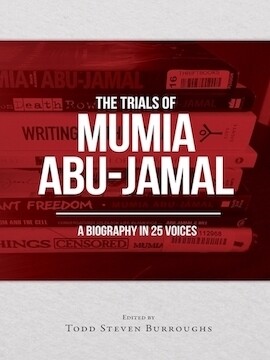
The Trials of Mumia Abu-Jamal: A Biography in 25 Voices – Available here
Todd Steven Burroughs, Ph.D., is the editor of The Trials of Mumia Abu-Jamal: A Biography in 25 Voices, an anthology published by Diasporic Africa Press.

